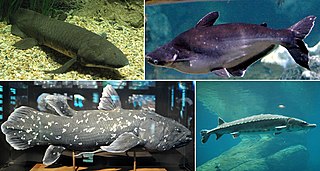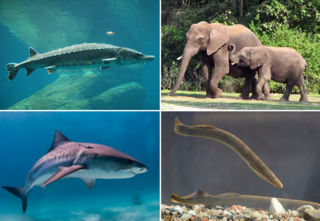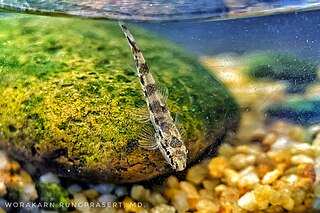
Actinopterygii, members of which are known as ray-finned fish or actinopterygians, is a class of bony fish that comprise over 50% of living vertebrate species. They are so called because of their lightly built fins made of webbings of skin supported by radially extended thin bony spines called lepidotrichia, as opposed to the bulkier, fleshy lobed fins of the sister class Sarcopterygii. Resembling folding fans, the actinopterygian fins can easily change shape and wetted area, providing superior thrust-to-weight ratios per movement compared to sarcopterygian and chondrichthyian fins. The fin rays attach directly to the proximal or basal skeletal elements, the radials, which represent the articulation between these fins and the internal skeleton.

Osteichthyes, also known as osteichthyans or commonly referred to as the bony fish, is a diverse superclass of vertebrate animals that have endoskeletons primarily composed of bone tissue. They can be contrasted with the Chondrichthyes and the extinct placoderms and acanthodians, which have endoskeletons primarily composed of cartilage. The vast majority of extant fish are members of Osteichthyes, being an extremely diverse and abundant group consisting of 45 orders, over 435 families and 28,000 species. It is the largest class of vertebrates in existence today, encompassing most aquatic vertebrates, as well as all semi-aquatic and terrestrial vertebrates.

Vertebrates are animals with a backbone or spine, consisting of vertebrae and intervertebral discs, and a cranium, or skull. The vertebrae are irregular bones, and the intervertebral discs are of fibrocartilage. The vertebral column surrounds and protects the spinal cord, while the cranium protects the brain.

Fish and chips is a hot dish consisting of battered and fried fish, served with chips. Often considered the national dish of the United Kingdom, fish and chips originated in England in the 19th century. Today, the dish is a common takeaway food in numerous other countries, particularly English-speaking and Commonwealth nations.

Hamilton Howard "Albert" Fish was an American serial killer, rapist, child molester and cannibal who committed at least three child murders between July 1924 and June 1928. He was also known as the Gray Man, the Werewolf of Wysteria, the Brooklyn Vampire, the Moon Maniac, and the Boogey Man. Fish was a suspect in at least ten murders during his lifetime, although he only confessed to three murders that police were able to trace to a known homicide. He also confessed to stabbing at least two other people.

Fish farming or pisciculture involves commercial breeding of fish, most often for food, in fish tanks or artificial enclosures such as fish ponds. It is a particular type of aquaculture, which is the controlled cultivation and harvesting of aquatic animals such as fish, crustaceans, molluscs and so on, in natural or pseudo-natural environments. A facility that releases juvenile fish into the wild for recreational fishing or to supplement a species' natural numbers is generally referred to as a fish hatchery. Worldwide, the most important fish species produced in fish farming are carp, catfish, salmon and tilapia.

Balitoridae, the hillstream loaches or river loaches, is a family, of small fish from South, Southeast and East Asia. The family includes about 202 species. They are sometimes sold as "lizardfish" or "flossensaugers". Many of the species are popular for aquaria, species in the genus Sewellia are most commonly sold in the aquaria trade. They have a number of similarities with the Cobitidae, their sibling family of "loaches", such as multiple barbels around the mouth. They should not be confused with the loricariids, which look similar but are a family of catfish.

Pisces (♓︎) is the twelfth and final astrological sign in the zodiac. It is a mutable sign. It spans 330° to 360° of celestial longitude. Under the tropical zodiac, the sun transits this area between about February 19 and March 20. In classical interpretations, the symbol of the fish is derived from the ichthyocentaurs, who aided Aphrodite when she was born from the sea.

Hugh McCormick Smith, also H. M. Smith was an American ichthyologist and administrator in the United States Bureau of Fisheries.

A fish is an aquatic, anamniotic, gill-bearing vertebrate animal with swimming fins and a hard skull, but lacking limbs with digits. Fish can be grouped into the more basal jawless fish and the more common jawed fish, the latter including all living cartilaginous and bony fish, as well as the extinct placoderms and acanthodians. Most fish are cold-blooded, their body temperature varying with the surrounding water, though some large active swimmers like white shark and tuna can hold a higher core temperature. Many fish can communicate acoustically with each other, such as during courtship displays. The study of fish is known as ichthyology.
Homalopteroides modestus is a species of ray-finned fish in the genus Homalopteroides. It can be found in lower Myanmar and Thailand.
Homalopteroides nebulosus is a species of ray-finned fish in the genus Homalopteroides. It can be found in Malaysia and Indonesia.
Homalopteroides rupicola is a species of ray-finned fish in the genus Homalopteroides. It can be found in Myanmar.
Homalopteroides smithi is a species of ray-finned fish in the genus Homalopteroides. It can be found in the Mekong and Chao Phraya basins and Malay Peninsula.

Homalopteroides tweediei is a species of ray-finned fish in the genus Homalopteroides. It can be found in the Mekong basin, Malay Peninsula, and Borneo.

Pescetarianism is a dietary practice in which seafood is the only source of meat in an otherwise vegetarian diet. The inclusion of other animal products, such as eggs and dairy, is optional. According to research conducted from 2017 to 2018, approximately 3% of adults worldwide are pescetarian.

Homalopteroides is a genus of freshwater ray-finned fishes belonging to the family Balitoridae, the loaches in this family are commonly known as hillstream loaches although this name also refers to the loaches in the family Gastromyzontidae. These loaches are found in Southeast Asia.
Homalopteroides stephensoni is a species of the genus Homalopteroides in the family Balitoridae. It can be found in the Kapuas and Mahakam rivers in Borneo.
Homalopteroides weberi is a species of the genus Homalopteroides in the family Balitoridae. It is found in west Borneo.
Homalopteroides yuwonoi is a species of ray-finned fish in the genus Homalopteroides.














